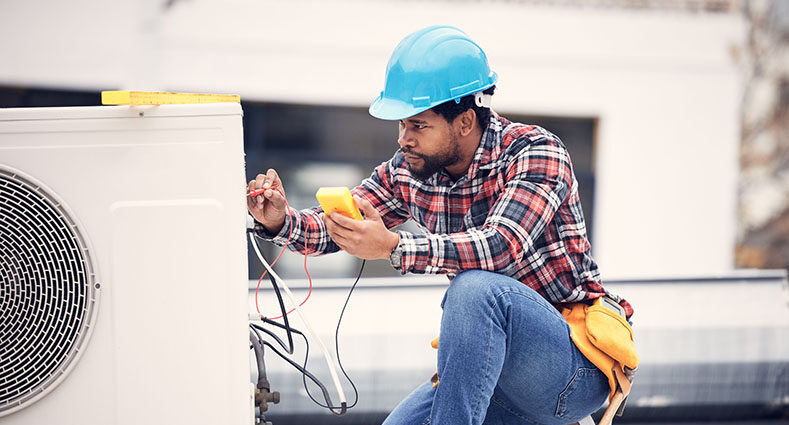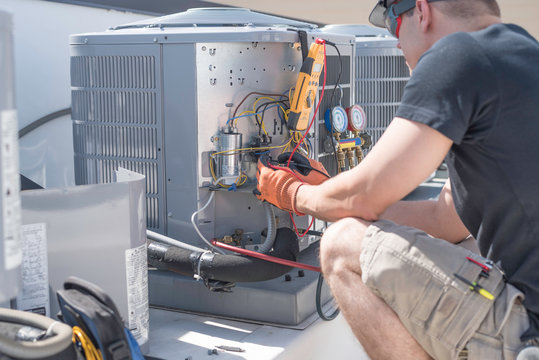All About HVAC: Identifying Common Issues and Effective Air Conditioning Fixing Approaches
A/c systems are crucial for preserving indoor comfort. Comprehending their parts and functionality is vital for determining typical problems. Homeowners frequently deal with issues such as ineffective air conditioning, unusual smells, or increasing energy expenses. These signs can show underlying issues that might call for interest. Exploring do it yourself troubleshooting strategies can be valuable, yet understanding when to look for expert help is just as crucial. What steps can be required to guarantee durable efficiency?
Understanding Your Cooling And Heating System: Parts and Capability
A HVAC system, commonly thought about the foundation of indoor environment control, consists of numerous crucial components that interact to manage temperature and air high quality. The primary aspects include the heating device, ventilation system, and cooling system. The home heating system, usually a furnace or central heating boiler, generates heat throughout chillier months, while the cooling unit cools interior spaces throughout the summer.

Usual A/c Problems Home Owners Encounter
Homeowners commonly face numerous common cooling and heating issues, including irregular temperature distribution throughout their space. Additionally, uncommon noises during operation can show underlying issues that call for interest. Dealing with these concerns immediately is essential for maintaining ideal system efficiency.
Inconsistent Temperature Circulation
Many homes experience the frustrating problem of irregular temperature circulation, where particular rooms feel annoyingly cozy while others remain as well cold. This trouble commonly arises from a selection of variables, including poor insulation, blocked vents, or an incorrectly sized HVAC system. When air ducts are not effectively secured or when furnishings obstructs airflow, some rooms may get not enough air conditioning. In addition, thermostat placement can greatly influence temperature policy; a thermostat located in a sunlit area may misrepresent the general temperature of your home. Normal upkeep, consisting of cleansing filters and ensuring ductwork is clear, can help reduce these inconsistencies. House owners might likewise take into consideration zoning systems to far better control temperature levels throughout various locations of the home, advertising a much more comfortable living environment.
Uncommon Sounds Throughout Procedure
When an a/c system runs, uncommon sounds can suggest underlying issues that require focus. Home owners might come across a series of noises, such as grinding, squeaking, or hissing. Grinding noises typically indicate worn-out bearings or parts, while squealing can suggest loose belts or components requiring lubrication. Hissing may indicate a cooling agent leakage, which can jeopardize the system's efficiency. Additionally, banging audios may direct to loose ductwork or an issue with the blower follower. Each of these noises acts as a caution, motivating home owners to check out even more. Neglecting these indicators can cause even more considerable issues and costly fixings. Routine upkeep and punctual interest to uncommon noises can enhance system long life and performance, guaranteeing a comfy living atmosphere.
Signs That Indicate Your Air Conditioner Needs Fixing
How can one inform if their a/c device needs fixing? A number of indicators may show underlying issues requiring specialist focus. First, if the a/c falls short to cool down the space properly, it may suggest a cooling agent leak or compressor malfunction. In addition, an increase in energy costs without corresponding usage adjustments can signal ineffectiveness in the system. Homeowners ought to likewise look out to uncommon scents emanating from the device, which could indicate mold development or electric concerns. If the Air conditioner regularly cycles on and off, it might be a sign of a defective thermostat or other mechanical problems. The existence of water pooling around the unit can indicate a clogged drain line. Recognizing these signs early can conserve money and time, making certain that the cooling system runs successfully and efficiently.
Do It Yourself Troubleshooting Techniques for Cooling And Heating Issues
When encountering cooling and heating concerns, home owners can use a number of DIY troubleshooting techniques to determine the issue. Key techniques include checking thermostat setups, evaluating air filters, and reviewing drain problems. These actions can assist identify common breakdowns prior to seeking professional aid.
Examining Thermostat Settings
What steps should property owners take to assure their thermostat setups are proper? Initially, they ought to verify the thermostat is established to the preferred temperature and setting, whether heating or air conditioning. Looking for a clear display and validating the thermostat is not established to "hold" or "vacation" setting is necessary. Homeowners must additionally validate that the thermostat is level and set up in an area without drafts, straight sunshine, or other temperature view level influences. In addition, altering the thermostat can aid provide exact analyses. If the thermostat operates batteries, replacing them may resolve any type of issues. By methodically evaluating these variables, property owners can usually determine and fix thermostat-related problems, promoting optimal heating and cooling system performance.
Inspecting Air Filters
Air filters play an important function in keeping perfect a/c efficiency. They catch dirt, allergens, and other particles, ensuring clean air flow. Gradually, filters can come to be clogged, reducing airflow and effectiveness. To check air filters, people need to first find the filter, commonly located in the return duct or residential furnace near the furnace. Once located, they ought to assess the filter's condition-- if it appears dirty or stained, it likely demands substitute. The majority of filters call for transforming every 1-3 months, relying on use and ecological factors. Regular inspection and prompt substitute of air filters not just boost air top quality yet additionally lengthen the life-span of cooling and heating systems, protecting against possible breakdowns and expensive repair work.
Assessing Drainage Issues
Just how can home owners properly determine and deal with drainage concerns within their cooling and heating systems? They need to evaluate the condensate drain line for clogs or clogs, which can lead to water buildup. House owners may make use of a wet/dry vacuum cleaner to clear any particles obstructing the line. Next, examining the drainpipe pan for corrosion or leaks is important, as a harmed frying pan can cause water to overflow. Normal cleansing of the drain line with a blend of vinegar and water helps stop future obstructions. Furthermore, ensuring correct slope of the drain line advertises effective water circulation. If these do it yourself techniques do not settle the concern, seeking advice from an expert a/c professional might be required to prevent possible water damage and system failure.
When to Call a Specialist for AC Repair Work

While some air conditioning problems can be taken care of through DIY techniques, there are scenarios where calling a professional ends up being necessary. Homeowners ought to seek skilled help when they run into relentless issues, such as insufficient cooling, odd noises, or unusual odors originating from the system. These signs might suggest deeper issues that call for specialized expertise and tools to detect and repair properly.

Preventative Maintenance Tips for A/c Long Life
Regular preventative maintenance can significantly boost the long life of heating and cooling systems. House owners must arrange yearly examinations by qualified technicians to evaluate system effectiveness and determine prospective problems. On a regular basis transforming or cleaning up air filters is necessary, as this assurances appropriate air flow and decreases strain on the system. Additionally, inspecting and securing ductwork stops power loss and boosts total efficiency.
It is additionally suggested to maintain the exterior device clear of particles and plants, permitting for peak air movement and warm exchange. House owners must check the condensate drainpipe for obstructions to prevent water damage and mold growth. Additionally, preserving proper thermostat settings and utilizing programmable alternatives can improve power performance. Finally, documenting maintenance tasks aids track service history and can aid in recognizing reoccuring problems (Fix broken Air conditioner). By adhering to these preventative steps, people can maximize the effectiveness and life-span of their a/c systems
Regularly Asked Concerns
How Usually Should I Replace My HVAC System Filters?
Cooling and heating system filters must generally be changed every one to 3 months, depending on use, filter type, and ecological factors. Normal replacement assists keep effectiveness and air top quality, ensuring peak system performance throughout the year.
What Dimension Cooling And Heating System Do I Required for My Home?
To establish the ideal cooling and heating system size for a home, one should consider square footage, insulation quality, and local environment. Consulting a specialist can aid ensure maximum efficiency and convenience for the specific living area.
Exist Eco-Friendly Cooling And Heating Options Available?
Yes, green cooling and heating options are available, including energy-efficient warm pumps, solar-powered systems, and geothermal home heating. These alternatives lower energy intake and ecological influence, advertising sustainability while maintaining efficient environment control for residential and business spaces.
How Can I Enhance My HVAC System's Power Efficiency?
To enhance a/c energy effectiveness, one can routinely preserve the system, seal air leakages, install programmable thermostats, utilize energy-efficient filters, and guarantee sufficient insulation throughout the home to decrease energy usage and boost performance.

What Is the Ordinary Lifespan of a Cooling And Heating System?
The average lifespan of a heating and cooling system normally varies from 15 to 25 years, relying on variables such as upkeep, use, and the top quality of installment. Routine maintenance can considerably prolong its functional longevity.
Final thought
In summary, an extensive understanding of hvac contractor jobs a/c systems equips property owners to determine common issues and address small issues successfully. Acknowledging indicators of malfunction, using do it yourself repairing techniques, and focusing on normal upkeep can improve system performance and performance. When encountered with intricate fixings, enlisting expert assistance is critical to guarantee safety and longevity. By fostering understanding and proactive treatment, people can enjoy a comfortable interior environment while lessening unanticipated expenses associated with HVAC failings.